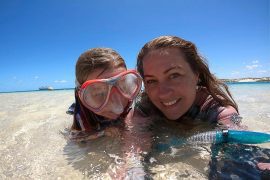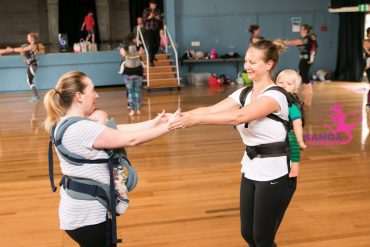Adjusting your dog’s activity requirements
You may not have as much time for your pet, immediately after your new baby comes home. A few months before your baby arrives, start decreasing the level and intensity of physical activity. You could consider replacing some of those long walks with easier at-home training, or enrichment or puzzle toys. Puzzles and brain games will keep your dog amused and stimulated as you lounge around nursing a hungry baby.
Do you have friends or family who can help out? You could also explore dog walking or doggy day-care. Be sure to thoroughly check pet services out and ensure they have appropriate levels of supervision and qualified staff. Good dog day cares will usually require a trial day to check your dog is suited to their environment and may not be able to book your dog in at short notice, so organise this before your baby arrives.
The first introduction
Before you bring your baby home from the hospital, have your partner or friend take home something with the baby’s scent (such as a blanket) for your pet to investigate. When you return from the hospital, your pet may be eager to greet you and receive your attention. Have someone take the baby into another room while you give your pet a warm, but calm, welcome. Keep some treats handy so you can distract your pet, and reward them with treats for appropriate behaviour.
It is essential to supervise every interaction between your pet and baby, and never allow face-to-face contact. As your child gets older and more mobile, it is important to prevent them from climbing on your dog or touch their bed or toys. It’s also a good idea to improve your understanding of canine body language so you don’t misinterpret dog behaviour. Too many people think dogs are happy with the baby, but in fact they are showing signs of stress and anxiety, such as lip licking, panting, or a tense face and ears.
Five good ideas for those first few weeks
- Ask someone to take your dog out for a long adventure walk, at least once a week. This gives your dog a good run around to burn off their energy and enjoy time outside, and gives you a break to focus on your baby for a few hours.
- Have plenty of food for yourself and your pets stored in the house to allow easy in-house enrichment for them and nutritious ready-made meals for you.
- Spend 5-10 minutes cuddling your cat or dog each day. They appreciate your attention and it is a good way to calm yourself if struggling with the demands of a baby.
- Invest in a baby wrap or a sling to allow you to move around the house and interact with your pets with free hands, making it easy to toss treats and hand out toys to them without balancing a baby.
- Make sure you have a secure covered bin for dirty nappies to keep nosy noses out of!
[Ends]
For more information and interview requests please contact:
Sarah Hitchings
SPCA Senior Communications Coordinator
P: +64 20 4173 8225
E: sarah.hitchings@spca.nz
About SPCA
SPCA is the voice for neglected, abandoned or abused animals of New Zealand. With 39 Centres nationwide, we are the country’s biggest animal charity.
Our mission is to improve the welfare of all animals in New Zealand. We work to achieve our mission in a number of ways – from nationwide desexing initiatives to reduce the number of unwanted pets, to working with schools to educate the next generation of animal owners.
We also uphold the Animal Welfare Act 1999 and prosecute where necessary. SPCA is the only charity in New Zealand entrusted to do this vital work.










